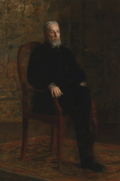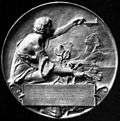Robert Curtis Ogden

Robert Curtis Ogden (June 20, 1836 Philadelphia-August 6, 1913 Kennebunkport, Maine) was a United States businessman and promoted education in the South.[1]
Biography
He began work in a dry-goods store at 14 years of age, and moved with his family to New York City in 1852. By 1860, he had married Ellen Lewis, was living in Brooklyn, and was a partner in the clothing firm of Devlin and Company. He served a few months as a soldier during the Civil War. In 1861 he had visited the South as an agent of his firm. Once peace was established, he was much impressed by the work of his friend Samuel C. Armstrong, who founded and headed Hampton Institute in Virginia. Ogden resolved to make similar efforts to promote education in the South.[1]


In 1879, he associated with John Wanamaker in his retail operations in Philadelphia. He also became a trustee at Hampton, and involved himself in the promotion of education for both blacks and whites in the South. He eventually headed the Southern Education Board which worked for better funding and higher standards for Southern schools. As a member of the General Education Board, he participated in the funding of Southern educational projects.[1] He was also president of the Conference for Education in the South.[2]
He was a great financial supporter of Booker T. Washington, and took part publicly speaking on his behalf, including at the Tuskegee Institute Silver Anniversary Lecture at Carnegie Hall in 1906, where he introduced Washington after Mark Twain had spoken.
He received honorary degrees from several institutions.[2] He was an elder and a liberal member of the Presbyterian Church.[1]
Literary works
- “Samuel Chapman Armstrong,” his Founder's Day address at Hampton Institute (1894)
- Pew Rents and the New Testament (1892)
- Sunday School Teaching (1894)
References
- 1 2 3 4 William Bristol Shaw (1934). "Ogden, Robert Curtis". Dictionary of American Biography. New York: Charles Scribner's Sons.
- 1 2
 "Ogden, Robert Curtis". Encyclopedia Americana. 1920.
"Ogden, Robert Curtis". Encyclopedia Americana. 1920.
External links
-
 "Ogden, Robert Curtis". The New Student's Reference Work. 1914.
"Ogden, Robert Curtis". The New Student's Reference Work. 1914. -
 "Ogden, Robert Curtis". Collier's New Encyclopedia. 1921.
"Ogden, Robert Curtis". Collier's New Encyclopedia. 1921.